The AMD Ryzen 5 1600X vs Core i5 Review: Twelve Threads vs Four at $250
by Ian Cutress on April 11, 2017 9:00 AM ESTBenchmarking Performance: CPU Encoding Tests
One of the interesting elements on modern processors is encoding performance. This includes encryption/decryption, as well as video transcoding from one video format to another. In the encrypt/decrypt scenario, this remains pertinent to on-the-fly encryption of sensitive data - a process by which more modern devices are leaning to for software security. Video transcoding as a tool to adjust the quality, file size and resolution of a video file has boomed in recent years, such as providing the optimum video for devices before consumption, or for game streamers who are wanting to upload the output from their video camera in real-time. As we move into live 3D video, this task will only get more strenuous, and it turns out that the performance of certain algorithms is a function of the input/output of the content.
7-Zip
One of the freeware compression tools that offers good scaling performance between processors is 7-Zip. It runs under an open-source licence, is fast, and easy to use tool for power users. We run the benchmark mode via the command line for four loops and take the output score.
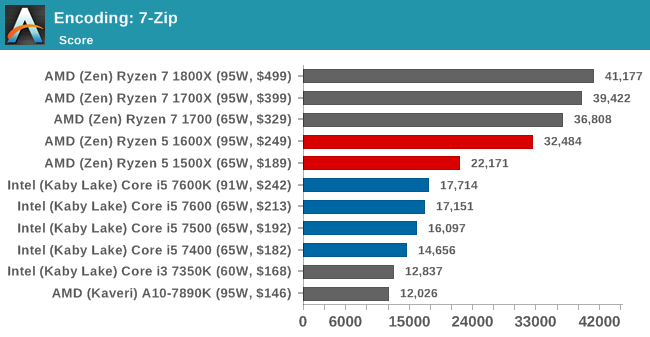
WinRAR 5.40
For the 2017 test suite, we move to the latest version of WinRAR in our compression test. WinRAR in some quarters is more user friendly that 7-Zip, hence its inclusion. Rather than use a benchmark mode as we did with 7-Zip, here we take a set of files representative of a generic stack (33 video files in 1.37 GB, 2834 smaller website files in 370 folders in 150 MB) of compressible and incompressible formats. The results shown are the time taken to encode the file. Due to DRAM caching, we run the test 10 times and take the average of the last five runs when the benchmark is in a steady state.
AES Encoding
Algorithms using AES coding have spread far and wide as a ubiquitous tool for encryption. Again, this is another CPU limited test, and modern CPUs have special AES pathways to accelerate their performance. We often see scaling in both frequency and cores with this benchmark. We use the latest version of TrueCrypt and run its benchmark mode over 1GB of in-DRAM data. Results shown are the GB/s average of encryption and decryption.
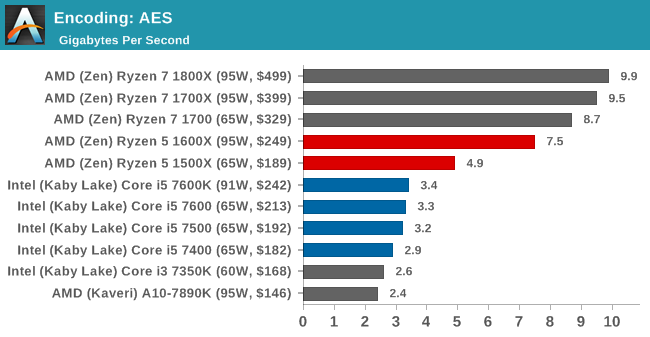
HandBrake H264 and HEVC
As mentioned above, video transcoding (both encode and decode) is a hot topic in performance metrics as more and more content is being created. First consideration is the standard in which the video is encoded, which can be lossless or lossy, trade performance for file-size, trade quality for file-size, or all of the above can increase encoding rates to help accelerate decoding rates. Alongside Google's favorite codec, VP9, there are two others that are taking hold: H264, the older codec, is practically everywhere and is designed to be optimized for 1080p video, and HEVC (or H265) that is aimed to provide the same quality as H264 but at a lower file-size (or better quality for the same size). HEVC is important as 4K is streamed over the air, meaning less bits need to be transferred for the same quality content.
Handbrake is a favored tool for transcoding, and so our test regime takes care of three areas.
Low Quality/Resolution H264: He we transcode a 640x266 H264 rip of a 2 hour film, and change the encoding from Main profile to High profile, using the very-fast preset.
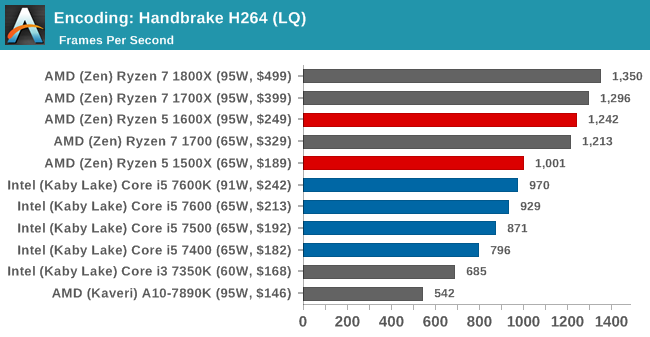
High Quality/Resolution H264: A similar test, but this time we take a ten-minute double 4K (3840x4320) file running at 60 Hz and transcode from Main to High, using the very-fast preset.
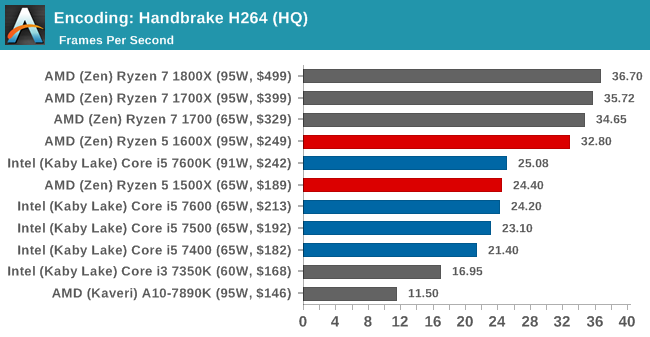
HEVC Test: Using the same video in HQ, we change the resolution and codec of the original video from 4K60 in H264 into 4Kp30 HEVC. This causes a dramatic reduction in filesize (this is a different test to the Ryzen 7 review).
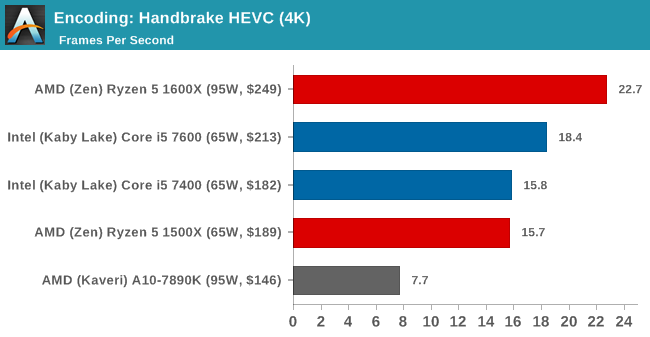


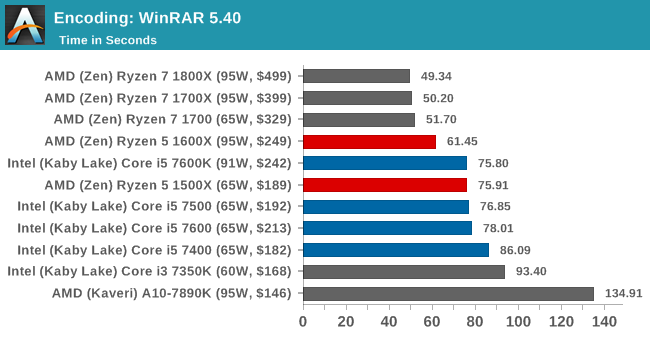








254 Comments
View All Comments
hojnikb - Tuesday, April 11, 2017 - link
Any word on R5 1400 review ? Would be interesting to see how 1/2 of L3 cache hits performance.Ian Cutress - Tuesday, April 11, 2017 - link
We've been promised a sample to arrive soon. I'm off some of next week, so after then :)Omega215D - Tuesday, April 11, 2017 - link
Just steal it from LinusTechTips... You know he has that stuff just lyin' around after fumbling with it =)msroadkill612 - Thursday, April 13, 2017 - link
No, but we have evidence of the effect of double l3 on ryzen cores - if that helps.current 4 core ryzens have double the l3 per core as 8 core ryzens do.
Infy2 - Tuesday, April 11, 2017 - link
Shame 7700K is not among the results so we can't compare Ryzen 4C/8T to the best of Intel's 4C/8T.ddriver - Tuesday, April 11, 2017 - link
Slightly better in games, marginally behind in intensive computations.Ian Cutress - Tuesday, April 11, 2017 - link
For CPU tests, it's in our Benchmark database: www.anandtech.com/benchI still need to run our gaming tests on a whole raft of CPUs, something to do the rest of this month!
0ldman79 - Tuesday, April 11, 2017 - link
Any chance the formatting could be corrected to the FX line can be directly compared to the Ryzen line?Some of the benchmarks overlap but the formatting is different. A direct comparison isn't possible now in a single window. We have to open two windows to compare.
Ian Cutress - Friday, April 14, 2017 - link
All the old data was on Windows 7, the new data is Windows 10. I've made it so in the same window the scores are comparable on the same OS.milli - Tuesday, April 11, 2017 - link
Something really weird is going on with the Rise of the Tomb Raider and Ryzen. There's a huge drop in performance in DX12 for Ryzen+nVidia.I mean, how on earth can the A10-7890K be faster than the 1500X? That game or nVidia's drivers need updating.